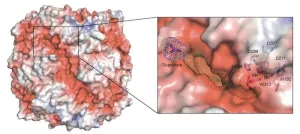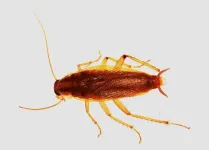(Press-News.org) Immune cell regulator discovery could lead to treatments for arthritis and severe COVID
The discovery of a new regulator affecting immune cells could lead to new treatments to reduce inflammation in diseases including arthritis and severe COVID 19.
A large research collaboration, led by the University of Exeter’s MRC Centre for Medical Mycology, has focused on how immune cells sense their environment. This activity triggers responses which are finely balanced, to protect against disease and infection, and to reduce cell-damaging inflammation.
The new research, published in Nature and funded by the Medical Research Council and Wellcome, looked at the behaviour of a receptor known as MICL, and its role in both preventing inflammation and protecting against infection.
Lead author Dr Mariano Malamud, from the University of Exeter, said: “We’ve discovered that MICL is a key receptor that causes severe inflammatory disease when its functions are altered. This opens the door to the development of new therapies that target MICL, which could reduce the severity of inflammatory diseases and protect against infection.”
Most receptors in the immune system sense their environment and send signals to cells, telling them to activate in response to changes such as infection or tissue damage. The team’s work has revealed that MICL does the opposite, inhibiting the activation of the cell. This is an important function, as over-activation of cells can lead to cell damage and the development of auto-immune diseases if left unchecked. The team went on to demonstrate the essential role that MICL plays in regulating inflammation in severe COVID 19, as well as arthritis and some other autoimmune diseases.
The new research , conducted in mice and verified in patients, focuses on the function of MICL present on the most abundant form of immune cell called a neutrophil. As a result of autoimmune disease or infection, neutrophils can undergo NETosis, a form of programmed cell death which is key for controlling infections but is very inflammatory. The team has found that MICL is able to detect this, and its inhibitory activity prevents more neutrophils from dying in this way.
NETosis cell death has been linked to several inflammatory diseases in humans, including Lupus, Rhematoid arthritis and severe COVID. These inflammatory diseases lead to the production of antibodies that bind to MICL, preventing its inhibitory function and resulting in more severe disease. Conversely, the study showed that increasing NETosis by blocking MICL function can protect against infection, such as those caused by fungi.
In mice with arthritis, the group showed that genetic loss of MICL led to more severe disease due to the excessive formation of NETs. More severe disease also occurred in normal mice when antibodies targeting MICL were applied. Indeed more severe disease was also seen in human arthritis patients who possessed antibodies targeting MICL, an the researchers could directly show that these patient antibodies drove exacerbated inflammatory response, using cell samples in labs.
Senior author Professor Gordon Brown, from the University of Exeter, said: “We’ve been working on how immune cells sense their environment for over 20 years, and this breakthrough is really exciting, revealing how the inhibition of inflammatory processes is finely balanced between controlling infection and the development of autoimmune disease”
The paper is entitled “Recognition and control of Neutrophil Extracellular Trap formation by MICL’, and is published in Nature.
ENDS
*Labels applied according to the Academy of Medical Sciences press release labelling system
The study will publis on this link once the embargo lifts: https://www.nature.com/articles/s41586-024-07820-3
END
Immune cell regulator discovery could lead to treatments for arthritis and severe COVID
The discovery of a new regulator affecting immune cells could lead to new treatments to reduce inflammation in diseases including arthritis and severe COVID 19.
2024-08-14
ELSE PRESS RELEASES FROM THIS DATE:
Brigham researchers develop an implantable device to detect and respond to opioid overdose
2024-08-14
In preclinical models, the subcutaneously implanted device continuously monitored vital signs and delivered naloxone automatically and rapidly when it detected opioid overdose
The opioid epidemic continues to have devastating effects in the United States, exacerbated by the increasing presence of fentanyl in illicit opioids. Naloxone is an effective antidote, but it usually requires rapid administration from a bystander. Now, researchers from Brigham and Women’s Hospital, a founding member of the Mass General Brigham healthcare ...
Larger teams in academic research worsen career prospects, study finds
2024-08-14
As the Paris Olympics captured the world’s attention this month, it proved apparent that winning medals often hinged on the success of teamwork.
While such an approach clearly works in sports, new research suggests teamwork is not always the desired method … especially for young scientists trying to find an academic job.
“We found that if your team size in your discipline is large, your prospects for an academic career go down,” said Donna Ginther, the Roy A. Roberts Distinguished Professor of Economics at the University of Kansas.
Her paper titled “The rise of teamwork and career prospects in academic science” ...
Newly discovered ability of comammox bacteria could help reduce nitrous oxide emissions in agriculture
2024-08-14
An international research team led by the Centre for Microbiology and Environmental Systems Science (CeMESS) at the University of Vienna has discovered that comammox bacteria, first identified by them in 2015, can grow using guanidine, a nitrogen-rich organic compound, as their sole energy and nitrogen source. This unique ability opens new avenues for targeted cultivation of these enigmatic microbes and could also provide a key to reducing agricultural nitrous oxide emissions. The research findings were recently published as an article in the prestigious journal Nature.
Nitrification, the conversion of ammonia via nitrite to nitrate, is ...
Cybersecurity flaws could derail high-profile cycling races
2024-08-14
High-end bicycles used for high-profile road races such as the Tour de France are vulnerable to cybersecurity attacks targeting the bike’s wireless gear shifting system.
In recent years, bicycle manufacturers have adopted wireless gear-shifting technology, which gives riders better control over changing gears. The technology is not vulnerable to the physical issues that plague mechanical systems. However, the way the wireless systems were built created critical cybersecurity vulnerabilities, which a team of computer scientists from the University of California ...
How bread dough gave rise to civilization
2024-08-14
A major international study has explained how bread wheat helped to transform the ancient world on its path to becoming the iconic crop that today sustains a global population of eight billion.
“Our findings shed new light on an iconic event in our civilisation that created a new kind of agriculture and allowed humans to settle down and form societies,” said Professor Brande Wulff, a wheat researcher at KAUST (King Abdullah University of Science and Technology) and one of the lead ...
Revealing the mysteries within microbial genomes
2024-08-14
A new technique developed at Lawrence Berkeley National Laboratory (Berkeley Lab) will make it much easier for researchers to discover the traits or activities encoded by genes of unknown function in microbes, a key step toward understanding the roles and impact of individual species.
The approach, called barcoded overexpression bacterial shotgun library sequencing, or Boba-seq, is described in a paper published August 5 in Nature Communications.
“There is so much genetic dark matter – ...
Consumer-grade insecticide sprays fail to control cockroaches, study shows
2024-08-14
Annapolis, MD; August 14, 2024—A common variety of consumer insecticide sprays is mostly ineffective and of "little to no value" in eliminating cockroach infestations, a new study shows.
Residual insecticides are designed to be sprayed on surfaces where cockroaches are likely to appear, exposing them to the toxic ingredient when they move across the surface later. But laboratory testing by researchers at the University of Kentucky and Auburn University shows that the residues have little effect on German cockroaches (Blattella germanica), ...
Children’s Hospital of Philadelphia researchers find possible inaccuracies in crash-reported child passenger injuries
2024-08-14
Philadelphia, August 14, 2024 – Researchers from the Center for Injury Research and Prevention (CIRP) at Children’s Hospital of Philadelphia (CHOP) found discrepancies between crash reports and hospital data that might paint an incomplete or inaccurate picture of how crashes impact the safety of child passengers. Enhancing the quality of injury data reported in crash reports can aid researchers in assessing the effectiveness of various transportation safety strategies for children. The findings were recently published by ...
Ontario Institute for Cancer Research announces awards for eight research teams developing innovative ways to diagnose and treat cancer
2024-08-14
August 14, 2024, TORONTO — A new round of awards from the Ontario Institute for Cancer Research (OICR) will jumpstart eight promising studies that could change how cancers are diagnosed and treated.
OICR announced the results of its Pre-Clinical Acceleration Team Awards — part of the Institute’s Clinical Translational Pathway, which helps advance new discoveries so they can benefit people affected by cancer.
The winning research teams are based across Ontario and are tackling some of the most common and hardest to treat cancers. They are developing solutions to find cancer earlier, diagnose it more ...
People with COPD, asthma have higher risk of health problems from increased wildfire activity, smoke
2024-08-14
MIAMI (August 14, 2024) – Communities impacted by increased wildfire activity and smoke can use a population health-based action plan to help alleviate health risks, particularly for those with chronic obstructive pulmonary disease (COPD) and asthma, according to a new perspective article. The article is published in the July 2024 issue of Chronic Obstructive Pulmonary Diseases: Journal of the COPD Foundation, a peer-reviewed, open-access journal.
COPD is an inflammatory lung disease, comprising several conditions, ...
LAST 30 PRESS RELEASES:
Roadmap for Europe’s biodiversity monitoring system
Novel camel antimicrobial peptides show promise against drug-resistant bacteria
Scientists discover why we know when to stop scratching an itch
A hidden reason inner ear cells die – and what it means for preventing hearing loss
Researchers discover how tuberculosis bacteria use a “stealth” mechanism to evade the immune system
New microscopy technique lets scientists see cells in unprecedented detail and color
Sometimes less is more: Scientists rethink how to pack medicine into tiny delivery capsules
Scientists build low-cost microscope to study living cells in zero gravity
The Biophysical Journal names Denis V. Titov the 2025 Paper of the Year-Early Career Investigator awardee
Scientists show how your body senses cold—and why menthol feels cool
Scientists deliver new molecule for getting DNA into cells
Study reveals insights about brain regions linked to OCD, informing potential treatments
Does ocean saltiness influence El Niño?
2026 Young Investigators: ONR celebrates new talent tackling warfighter challenges
Genetics help explain who gets the ‘telltale tingle’ from music, art and literature
Many Americans misunderstand medical aid in dying laws
Researchers publish landmark infectious disease study in ‘Science’
New NSF award supports innovative role-playing game approach to strengthening research security in academia
Kumar named to ACMA Emerging Leaders Program for 2026
AI language models could transform aquatic environmental risk assessment
New isotope tools reveal hidden pathways reshaping the global nitrogen cycle
Study reveals how antibiotic structure controls removal from water using biochar
Why chronic pain lasts longer in women: Immune cells offer clues
Toxic exposure creates epigenetic disease risk over 20 generations
More time spent on social media linked to steroid use intentions among boys and men
New study suggests a “kick it while it’s down” approach to cancer treatment could improve cure rates
Milken Institute, Ann Theodore Foundation launch new grant to support clinical trial for potential sarcoidosis treatment
New strategies boost effectiveness of CAR-NK therapy against cancer
Study: Adolescent cannabis use linked to doubling risk of psychotic and bipolar disorders
Invisible harms: drug-related deaths spike after hurricanes and tropical storms
[Press-News.org] Immune cell regulator discovery could lead to treatments for arthritis and severe COVIDThe discovery of a new regulator affecting immune cells could lead to new treatments to reduce inflammation in diseases including arthritis and severe COVID 19.




